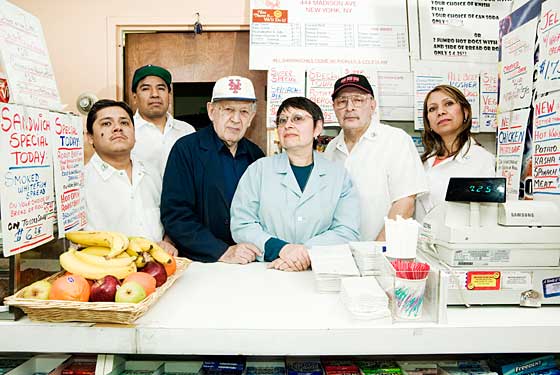
Y ou cannot get a decaf caramel macchiato with whipped cream and rainbow sprinkles at the Inhouse Nosh Cafe. In fact, horror of all horrors, they don’t have macchiatos period. They serve tea and coffee, in the standard hot and iced varieties, as well as toasted bagels, muffins, doughnuts, and all manner of chips, candy, gum, and soda. Then there are the house specialties, like the popular spinach pie (a lovely light crust), brisket sandwiches, blintzes, bialys, knishes, pierogi, grilled chicken in a pita, fillet of flounder, and the latest addition to the menu, vegetarian lasagne. Plus the egg salad is divine. All of this, and a morning-blitz counter staff of six, is crammed into a space no bigger than a studio apartment, festooned with handwritten signs that all but cry out, “We are an independently owned and operated establishment.” The Inhouse Nosh Cafe is an alive-and-kicking monument to the tenacity and spirit of homespun enterprise; in a neighborhood choked with franchises and conglomerates (a branch of the assembly-line pastry-and-sandwich joints known as Au Bon Pain is mere steps away), it survives on the basis of cheerful, lickety-split service, bargain prices (coffee is 85 cents, a full lunch can be had for less than $5), and location, location, location. (It is, let us now come clean, situated conveniently in the lobby of New York Magazine’s office building on Madison Avenue.) The staff pictured above come from Mexico, Tunisia, Hungary, Puerto Rico, and Ukraine. The owners, a pair of charming kibitzers, Andrew Spitz and Yana Baumblit, formed a team twenty years ago after Yana left her husband, with whom she ran a deli. Andrew and Yana, who say the key to their partnership is, “We trust each other with money,” operated a series of businesses together, then heard about the lobby space here; the landlord wanted a tenant who could do kosher, and that gave them an in over the chains. And there were other benefits that suited two hardworking people past the point in their lives when they wanted to close up shop at midnight: Being in an office building meant a five-day workweek, manageable hours (6 a.m. to 5 p.m.), and customers so regular you can’t help but know them by name. How much longer can they hold out? Andrew talks ominously of a Canadian firm that’s gobbling up the leases of lobby shops. But for now, business is good because people, like us, appreciate fresh, properly mayo’ed egg salad, a dependable smile from behind the counter, and a bit of Yana’s yelling at Andrew about something we can’t make out. “You come in here and you’re rude, we’ll be nice to you the next time,” says Yana, “because we know you and we know everybody has their bad days.”